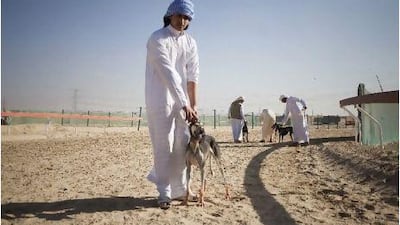WESTERN REGION // Animal lovers travelled to Madinat Zayed yesterday - but it was not the camels they had come to see.
They were looking forward to the first Arab Heritage Saluki Race Festival with its 150 purebred entrants.
Ten races, with 15 dogs in each of them, were held, with only 30 advancing to tomorrow's final round where they will race for a total prize fund of about Dh500,000.
Deirdre Hyde, from Scotland, drove from Abu Dhabi to support her South African friend, Jaci Wickham, who was the only woman owner among all the men who had dogs running in the races.
Obaid Khalfan al Mazrouei, the race manager, says that the event seeks to preserve an important heritage and to revive deep-rooted customs and traditions.
The Saluki is a clever and intelligent hunting breed which is directly descended from the wolf. A strong dog with stamina, the Saluki learns quickly and gets bored easily. It does not have to be trained to race since the concept is similar to hunting.
The dogs believed they were chasing a live gazelle. They are shown a blindfolded gazelle and are tricked into chasing a dummy gazelle which is tied to a car that stays 100 metres ahead of the leading dog. At the end of the 2km race, men rescue the gazelle that is often surrounded by the muzzled dogs.
"If they know that they are running behind a dummy they take shortcuts to catch it," says Mr al Mazrouei.
"I think it's fascinating," says Ms Hyde. "Not that they [Salukis] are becoming extinct, but they were a unappreciated breed for years, and it's wonderful to have a revival."
Her friend, Heather Dalglish, an English woman living in Abu Dhabi, was equally entranced.
"I am planning on how to train my two dogs," she says, laughing. "I was gifted Salukis; they are not supposed to be purchased."
Ms Wickham's dog, an 18-month-old called Savannah, did not finish its race. But she praised all the other owners. "They were very welcoming to a western woman. I am definitely coming back after some training," she says.
"I am telling you," adds Ms Wickham who is also an Arabian racehorse trainer, "it's the next big sport here."
Saif Mohammed, a trader from Al Ain, was typical of the cheering onlookers.
"I am happy to see this race and would like to see racing events in every emirate," he says. "Salukis remind me of my forefathers, who went hunting with falcons and Salukis."
The low-maintenance dogs run gracefully at a speed of about 65kph. They can chase a gazelle for 5km or more. "There is no special food, like special canned food," says Mr al Mazrouei, who is also a breeder. "They eat rice, dates, meat - whatever the owner eats."
They are also quite sensitive, he adds. "When you shout at them, they get upset if they haven't done anything wrong."
Though Salukis were an integral part of the Bedouin culture - they were used mainly for guarding and hunting - their use in recent years is minimal.
Hunting with a Saluki is banned in the UAE, so some owners take the dogs to Pakistan.
Efforts are being made to keep the Arabian Salukis pure by maintaining a breeding record.
"The name Saluki originates from the Yemeni tribe called Bani Saluk," says Hamad al Ghanaim, the director of the Arabian Saluki Centre.
"The tribe was known for loving and respecting this animal for its central position in the daily life, being a hunter who helped bring their food.
"Salukis are bold and daring like a Bedouin."

